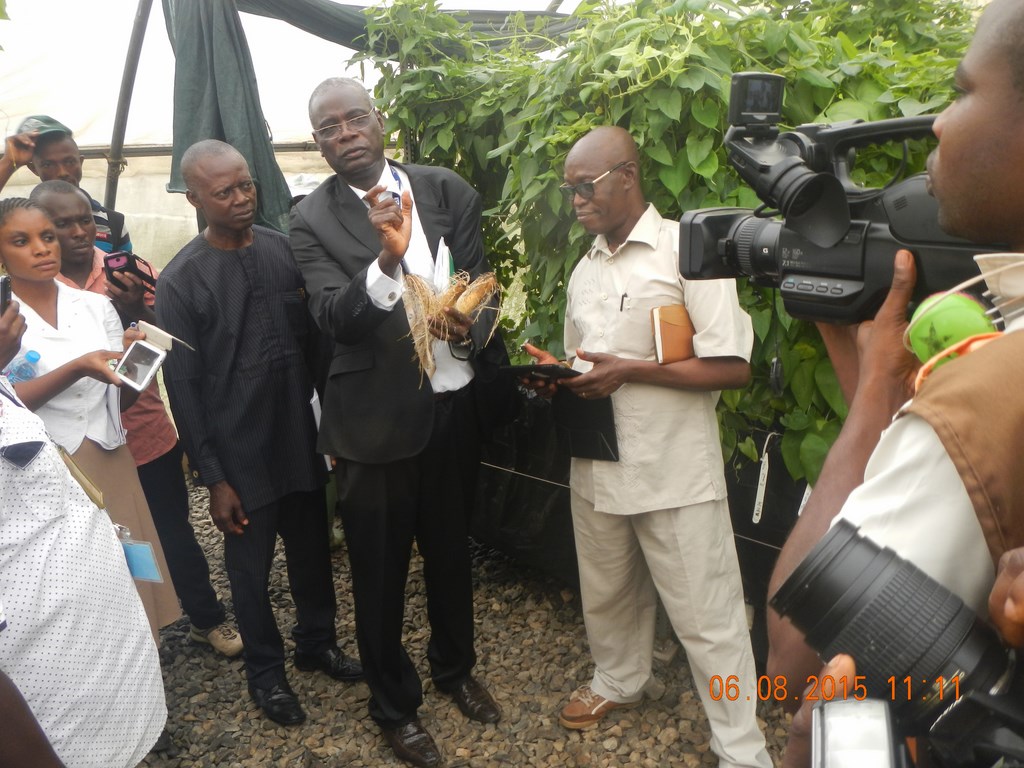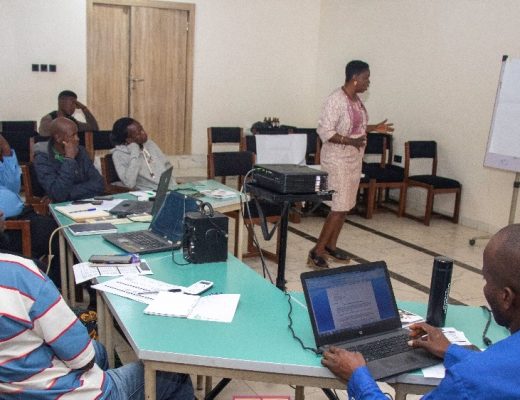Top seed production companies from across Nigeria convened at IITA on 6 August to explore novel technologies for high-ratio propagation of seed yam tubers.
IITA scientists working on the Yam Improvement for Income and Food Security in West Africa (YIIFSWA) project have developed novel high ratio propagation technologies such as vine cuttings, aeroponics, and bioreactor to address the constraints of quality, rapidity, and multiplication in seed yam production.
According to Robert Asiedu, IITA’s Director for West Africa, “The unavailability and high cost of high quality seed yam is the primary constraint in West Africa with the food security of about 900 million people heavily dependent on the availability and affordability of seed tubers.”
Traditionally, farmers use tubers as seeds, which is inefficient and costly. High production costs are attributed to the use of seed yam tubers, which account for about 30% of the total yield and as much as 63% of the total variable cost incurred per season of cultivation. Moreover, most of the tubers are of low quality, containing pests (nematodes) and pathogens (virus), which decrease the yield of yam tubers.
Furthermore, using the traditional system, the multiplication rate in the field is also very low. In comparison to cereals which produce about 300 seeds from a single stock, yam produces about 1 to 5 tubers depending on the variety.
YIIFSWA Project Manager Norbert Maroya says: “Producing seed yam tubers using aeroponics, bioreactors, and vine cuttings is quick and cost effective, resulting in high-quality planting materials. The use of these novel, high-ratio propagation technologies gives a higher multiplication rate that is about 50-100 times more than the traditional system. It also significantly lowers the risk of nematode infestation and promotes faster multiplication and better and more uniform crop quality.”
“Seed is one of the most crucial elements in the livelihoods of agricultural communities. However, farmers—yam farmers in particular—are yet to benefit from using quality seed tubers because of inefficient seed production, and lack of distribution and quality assurance systems in the country. That is why we are calling for greater involvement of the private sector in the establishment of a formal seed system with the yam value chain,” said Ebenezer Zidafomor, a representative from the National Agricultural Seed Council (NASC). Participants came from Greengold Construct Nig. Ltd, Mamora Seeds Ltd, Da Allgreen Seeds Ltd, Bumfash Nigeria Ltd, Biocrops Ltd, NASC, all based in Abuja; Sylva Ejezie Farm Ltd, Asaba, Delta State; Lumiere Seeds Limited, Premier Seeds Nigeria Limited, Zaria, Kaduna; Romarey Ventures Limited, Jos; and Samlak Industries Ltd, Ibadan.
According to Lava Kumar, head of IITA’s germplasm health unit, “The new technologies for the production of virus-free plants and versatile diagnostic tools for virus indexing established in the YIIFSWA project are critically contributing to the development of clean seed yam systems.”
There is a need for government, research institutions, and the private sector to collaborate and develop solutions for the provision of food, poverty relief, and resource equity.
IITA works with various international and national institutions such as NASC through projects such as YIIFSWA. YIIFSWA’s goal is to help stop the decline and double the productivity of yam in the major producing countries, Ghana and Nigeria, that would stimulate a sustainable increase in incomes for smallholder yam producers and contribute to their food security and economic development.




No Comments